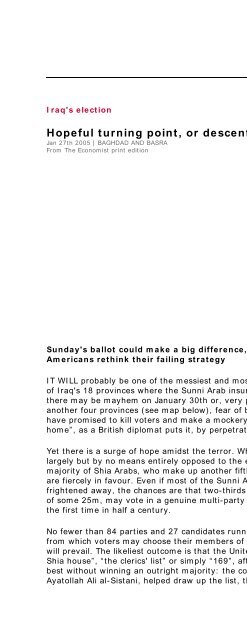The Economist - January 29th, 2005
The Economist - January 29th, 2005
The Economist - January 29th, 2005
You also want an ePaper? Increase the reach of your titles
YUMPU automatically turns print PDFs into web optimized ePapers that Google loves.
Iraq's election<br />
Hopeful turning point, or descent into chaos?<br />
Jan 27th <strong>2005</strong> | BAGHDAD AND BASRA<br />
From <strong>The</strong> <strong>Economist</strong> print edition<br />
Sunday's ballot could make a big difference, but only if a new Iraqi government and the<br />
Americans rethink their failing strategy<br />
IT WILL probably be one of the messiest and most dangerous elections in living memory. In four<br />
of Iraq's 18 provinces where the Sunni Arab insurgency is strongest, including parts of Baghdad,<br />
there may be mayhem on <strong>January</strong> 30th or, very probably, a derisorily low turnout. In at least<br />
another four provinces (see map below), fear of bombs and bullets is rife. <strong>The</strong> insurgents, who<br />
have promised to kill voters and make a mockery of the polls, may seek to “play away from<br />
home”, as a British diplomat puts it, by perpetrating terror in previously quieter areas.<br />
Yet there is a surge of hope amidst the terror. While the fifth of Iraqis who are Sunni Arabs are<br />
largely but by no means entirely opposed to the election, nearly all Kurds and a very large<br />
majority of Shia Arabs, who make up another fifth and around three-fifths of Iraqis respectively,<br />
are fiercely in favour. Even if most of the Sunni Arabs voluntarily boycott the polls or are<br />
frightened away, the chances are that two-thirds of Iraq's 14m-odd eligible voters, in a population<br />
of some 25m, may vote in a genuine multi-party election—a dazzling rarity in the Arab world—for<br />
the first time in half a century.<br />
No fewer than 84 parties and 27 candidates running on their own are stuffed into a national list<br />
from which voters may choose their members of a national assembly. In truth, no one knows who<br />
will prevail. <strong>The</strong> likeliest outcome is that the United Iraqi Alliance (better known by Iraqis as “the<br />
Shia house”, “the clerics' list” or simply “169”, after its number on the vast ballot paper) will do<br />
best without winning an outright majority: the country's most influential clergyman, Grand<br />
Ayatollah Ali al-Sistani, helped draw up the list, though without formally blessing it.<br />
AP



